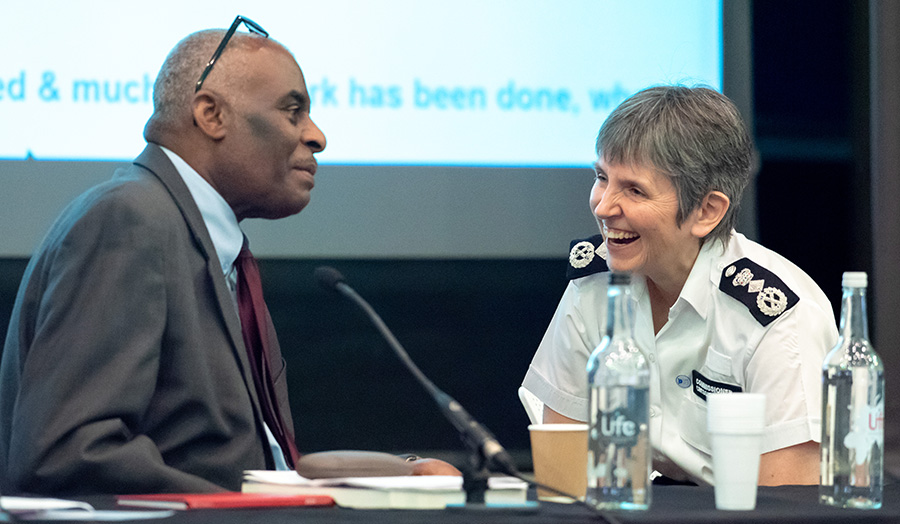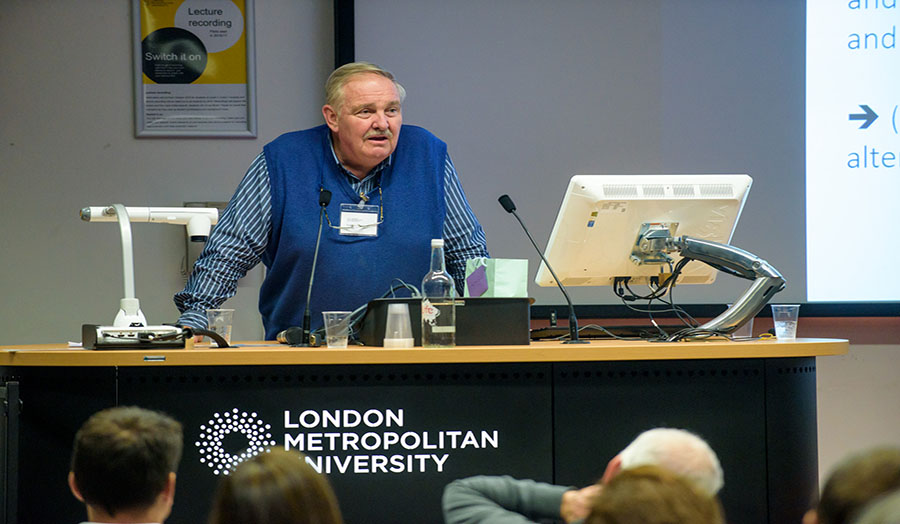Apply for this course
Please select when you would like to start:
Use the apply button to begin your application.
If you require a Student visa and wish to study a postgraduate course on a part-time basis, please read our how to apply information for international students to ensure you have all the details you need about the application process.
Why study this course?
Our Criminology MSc degree will allow you to develop an advanced knowledge of crime and offenders, as well as assess contemporary trends and concepts in criminal justice policy and community safety. You'll explore approaches to crime control within the community and penal institutions to gain the skills required to conduct research within the field of crime and criminal justice. This level of knowledge can prepare you for doctoral study or research posts within the criminal justice arena, but it's also ideal for consolidating your professional experience.
Gain a deeper knowledge of the criminal justice system
This course will allow you to develop an advanced knowledge of crime and offenders, as well as assess contemporary trends and concepts in criminal justice policy and community safety
Learn from industry professionals
London Met invites visiting professors and experts in criminal justice and criminal areas to the University to share their expertise
Develop your transferable skills
By the end of the course you’ll be able to deal with complex issues both systematically and creatively, making sound judgements in the absence of complete data and communicating your conclusions clearly
Course modules
The modules listed below are for the academic year 2024/25 and represent the course modules at this time. Modules and module details (including, but not limited to, location and time) are subject to change over time.
Year modules
Criminological Research Methods
This module currently runs:spring semester - Wednesday morning
(core, 20 credits)
The module seeks to provide a good grounding in the understanding and appreciation of criminological research methods. You will be taken through the process of conducting social research from the formulation of a research question through to the completion of a research project. You will learn how to design social research, analyse research data and present it in a clear and accessible way.
The module is comprised of lectures and seminar/workshops sessions. These are designed to help you understand the practicalities and challenges of conducting research in the 'real world'. You will receive tuition on quantitative methods with an emphasis on the use of SPSS in quantitative data analysis.
The module aims to:
1. Provide a thorough grounding in the understanding and appreciation of criminological research methods.
2. Develop a competence in understanding the strengths and limitation of quantitative and qualitative research.
3. Develop a competence in analysing quantitative and qualitative research data and writing research reports.
4. Assist you in designing and conducting research for your thesis, and in developing skills of critical reflection and analysis.
5. To critically appraise quantitative and qualitative research produced by statutory agencies (such the Home Office, the Metropolitan Police) and voluntary sector
organisations related to the Criminal Justice System to enhance your employment prospects.
Criminology Dissertation
This module currently runs:all year (September start) - Friday morning
summer studies - Friday morning
(core, 60 credits)
The dissertation is a triple-weighted module and is designed to provide an opportunity for you to undertake a substantial piece of research in their subject field. The dissertation is intended to build on the taught modules of the award and is underpinned by the Research Methods module, SS7079 Criminological Research Methods. The dissertation is designed to demonstrate synthesis of knowledge and skills developed throughout the award. It is the largest piece of assessed work undertaken on the award, and is seen as the clearest expression of your ability to study at Masters level.
The dissertation allows you to undertake an independent and sustained piece of research into a substantive topic of your own choosing. The dissertation
must include appropriate empirical research in the field of criminology and criminal justice. It must also be grounded in related criminological theories and relate to previous criminological research.
The dissertation has the following aims:
1. To undertake an independent investigation of one area or topic within the field of Criminology;
2. To demonstrate advanced and original application of research knowledge and skills to the proposed topic;
3. To provide an opportunity for systematic critical reflection on the research topic and its relationship to advanced scholarship in the field of study.
Critical and Justice Issues in Criminology
This module currently runs:autumn semester - Friday afternoon
(core, 20 credits)
In this module you will examine some key debates in criminology and criminal justice, by looking at core theoretical frameworks and contemporary research used to explain crime. You will apply this understanding to policy developments within criminal justice responses to crime.
Read full detailsExplaining Violence
This module currently runs:autumn semester - Wednesday afternoon
(core, 20 credits)
This module will allow you to investigate the complex issue of violence through a multidisciplinary approach. Indicative topics include serious youth violence, murder, football hooliganism and violence in the home. The module will be structured to identify and explain violent behaviour both in the West and the Global South. These will then be tied to the wider criminological field and possible prevention strategies will be considered.
There is a negotiated element to the module, allowing you to focus on topics specific to your own interests.
You are expected to attend and contribute to all seminar sessions, and attendance will be monitored. Sessions will require you to do some preparation, including the reading of academic journal articles, book chapters and research reports.
The module aims to:
1. Explore the prevalence of and trends in violence in the UK and globally
2. Identify and assess violent crimes
3. Recognize and contextualize various types of violence
4. Use various theories within the field of criminology and sociology to explain violent
behaviour
Terrorism and Radicalisation Studies
This module currently runs:spring semester - Thursday afternoon
(core, 20 credits)
You will explore the relationship between the state and terrorism and considers how the nation state has been the perpetrator and a motivating factor behind terrorist acts, as well as considering other reasons behind such acts of violence. You will consider the role of the state as a protector of its citizens has been challenged by its own actions and by terrorist organisations including groups such as ISIS. The module goes on to outline contemporary terrorist tactics and reviews the impact on national and international responses to terrorism.
The module aims are
1. Allow an exploration of the role of the state as protector from and perpetrator of terrorist violence
2. Learn about the different motivations for individuals and groups to become radicalised
3. Understand contemporary terrorist tactics within a historical context
4. Consider terrorism desistance
5. Outline the impacts of counter terrorism measures and the war on terror on both radicalisation and the wider public
Crime, Risk and Prevention
This module currently runs:spring semester - Thursday morning
(option, 20 credits)
This module explores the connections between the many factors that contribute to the onset of, prevention of, and desistance from, crime and other forms of risk-taking. It examines how these shape patterns of offending and victimisation. It takes an empirically-grounded, theoretically-informed approach and investigates the inter-relationships between formal social controls (as exercised through the criminal justice system) and informal social controls (as exercised through families, neighbourhoods, local economies and other social policies). It examines the relationships between youth offending, victimisation and crime, looking at a range of topics such as gangs and drugs, and trafficking. Finally, it will consider prevention strategies to understand what interventions might have reduced risk.
Aims:
● To develop an understanding of the history of the social construction of youth offending and the government’s responses to these issues.
● To analyse the connections between the many factors contributing to the onset of, prevention of, and desistance from, crime.
● To explore the role of support systems such as family, mentoring, schools in crime prevention and desistance.
● To critically explore the role of the criminal justice system in crime prevention.
● To apply key theoretical positions to a range of empirically-grounded studies of crime.
Gender, Victimisation and Crime
This module currently runs:autumn semester - Tuesday afternoon
(option, 20 credits)
This module examines the gendered nature of crime and victimisation. You will be introduced to key theories of the relationship between gender, crime and victimisation. You will gain an understanding of contemporary issues in the field of intersectional and post-colonial feminist theories. The module examines global crime issues including sex trafficking and illegal migration, drug trafficking, sexual violence in war, forced marriage and cybercrime and gender violence. In doing so, key definitional debates relating to social, political, media, cultural and ideological understandings of the phenomena are examined. Questions about the victim-offender overlap and the problematic responses will be tackled throughout the module.
The module aims to:
● Understand theories of gender, crime and victimisation.
● Develop a critical awareness of the broad social, cultural, economic and political aspects of gendered crime.
● Engage critically with the laws and policies.
● Assess the impacts and consequences of gendered crime.
Modern Slavery, Human Trafficking & Organised Crime
This module currently runs:autumn semester - Tuesday morning
(option, 20 credits)
This module examines the phenomena of modern slavery, human trafficking and organised crime from critical and theoretical perspectives. It explores an understanding of the forms, patterns and trends of modern slavery, human trafficking and organised crime. It will also include consideration of some relevant policy and legislation needed to address modern slavery, human trafficking and organised crime.
The module aims to:
1. Consider a variety of terms associated with human trafficking; its relationship with modern slavery, the sex industry and forced labour.
2. Examine the broad social, cultural, economic and political aspects of modern slavery, human trafficking and organised crime.
3. Evaluate the geographical and global influences on trafficking; such as migration flows, globalisation and conflict zones.
4. Understand the impacts and consequences of modern slavery, human trafficking and organised crime activities.
5. Discuss the relationship between the various forms of trafficking and organised crime, and both national and international legislation that has been established to address this growing criminal enterprise.
Psychology and Crime
This module currently runs:spring semester - Tuesday morning
(option, 20 credits)
The main aim of this module is to provide you with core knowledge and understanding of approaches to explaining criminal behaviour and its impact upon individuals and society.
During the course of studying this module you will cover some diverse topics including an overview of the major perspectives in criminology, a discussion on the measurement of crime and following from this workshops focusing on psychological elements to forms of crime and violence, such as sex offending, domestic violence, stalking and homicide.
When studying this module you will:
● Provide an overview of the measurement of crime and factors influencing the degree of error in this measurement.
● Provide an account of psychological factors that are related to or help to explain crime at both a general level and in terms of specific offences (e.g., arson) and specific offender groups (e.g., juveniles).
● Evaluate the contribution of psychology to the explanation of criminal behaviour relative to and in interaction with explanatory frameworks and factors from other disciplines.
Transnational Organised Crime
This module currently runs:autumn semester - Tuesday afternoon
(option, 20 credits)
The aim of this module is to give you a thorough theoretical and operational understanding of transnational organised crime and the social, political and economic dynamics in which it thrives. There will be a focus on trafficking, including of drugs, people and arms, corruption and money laundering as well as looking at how organised crime groups are using the internet for criminal purposes. Corporate and state-corporate crime and the way they intersect with organised crime, particularly in fragile states is also given a specific focus. On this module, you will also gain an understanding of the difficulties experienced when trying to prevent and regulate transnational organised crimes. You will be encouraged to actively participate in discussion and debates linked to key themes and given opportunities for reflective learning. You will develop the skills to investigate, critically examine, and present, orally and in writing, detailed analysis of transnational organised crimes, and the role played by states, corporations and individuals.
Read full details


















